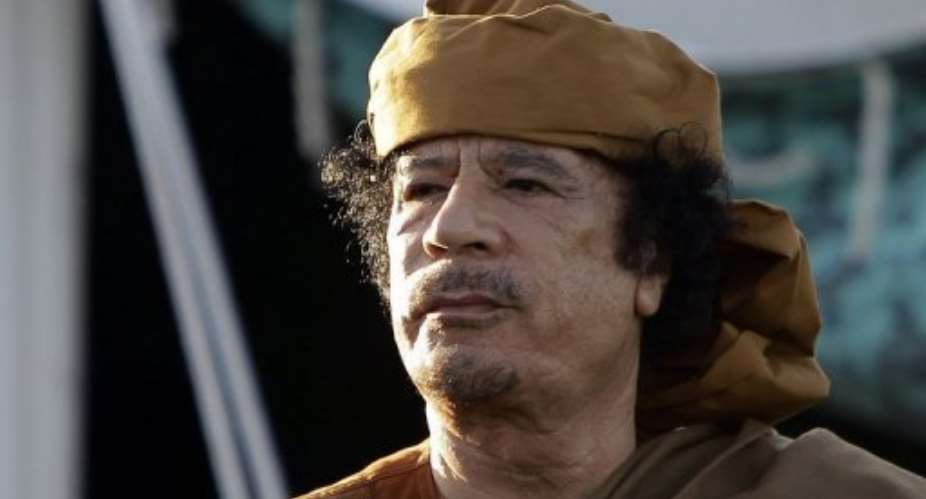PARIS (AFP) - Libya's new rebel rulers were hailed by world leaders in Paris on Thursday as ousted strongman Moamer Kadhafi issued a new barrage of threats from his desert hiding place.
Forty-two years to the day since Kadhafi stormed to power in a coup, senior envoys from 60 countries met the leaders of the revolution that overthew him to endorse the fledgling regime and offer practical support.
The Elysee Palace guest list was a victory in itself for the rebel National Transitional Council, as once sceptical Russia and China and Libya's reluctant neighbour Algeria agreed to extend their backing to the new government.
In Libya, meanwhile, the NTC said it had granted remaining loyalist troops defending Kadhafi's hometown Sirte another week to surrender, although some rebel commanders denied any knowledge of the offer.
Kadhafi, who might once have marked the coup anniversary with a triumphant speech, was reduced to releasing his latest bluster on tape, vowing: "We will not surrender. We are not women and we are going to keep on fighting."
In Paris, all was smiles. France's President Nicolas Sarkozy, the rebels' most prominent foreign backer, welcomed NTC leader Mustafa Abdel Jalil to the Elysee Palace for the talks with good news on the diplomatic front.
Russia -- which opposed NATO's military support for the rebels' battle to overthrow him -- said it recognised the NTC as Libya's "ruling authority".
China, which also had reservations about the air campaign, did not go so far, but said it "respects the choice made by the Libyan people and attaches importance to the significant position and role played by the NTC.
"We are willing to maintain close contact with it and push forward the smooth progress of China-Libyan relations," the foreign ministry said.
Of the major powers, only African Union heavyweight South Africa continued to snub the NTC. President Jacob Zuma boycotted the talks and said his country was "not happy" with NATO's decision to bomb Kadhafi's forces.
Russian and Chinese recognition were major diplomatic victories for the NTC regime, but the Algerian turnabout may prove of more immediate practical help in cutting off a potential Kadhafi escape route.
Libya's larger neighbour has been accused of supplying Kadhafi with arms and, after members of the fallen leader's family fled there, it was seen as a likely escape route for the strongman and his loyal sons.
But Algeria's Foreign Minister Mourad Medelci, in Paris for the conference, welcomed the NTC promise to set up a "government representative of all regions" and added: "When it has done so, we'll recognise it."
"The hypothesis that Mr Kadhafi could come knocking on our door was never considered," he insisted.
The talks -- attended by US Secretary of State Hillary Clinton, UN Secretary General Ban Ki-moon, British Prime Minister David Cameron and a host of foreign leaders and ministers -- began against the backdrop of a new Kadhafi rant.
He urged his supporters to keep up their resistance to the rebellion that has forced him into hiding.
"Even if you cannot hear my voice, continue the resistance," he said, in a message from a secret location. Kadhafi and his son Seif Al-Kadhafi have gone underground since rebels stormed into Tripoli on August 20.
"If they want a long battle, let it be long. If Libya burns, who will be able to govern it? Let it burn," declared Kadhafi.
Rebel officials say Kadhafi may be in the town of Bani Walid, south of the capital and still held by loyalist troops, but other reports suggest he could be in his hometown Sirte in Ghadames, near the Algerian border.
Thursday's conference in the French capital will discuss funding for Libya -- in particular the unblocking of assets frozen by UN sanctions -- as well as police training and diplomatic recognition for its new rulers.
"There are tens of billions of euros in frozen assets. The Americans have unblocked theirs and the British, French and Germans are doing the same," French Foreign Minister Alain Juppe told RTL radio.
© 2011 AFP





 Dumsor: Don't rush to demand timetable; the problem may be temporary — Atik Moha...
Dumsor: Don't rush to demand timetable; the problem may be temporary — Atik Moha...
 Space X Starlink’s satellite broadband approved in Ghana — NCA
Space X Starlink’s satellite broadband approved in Ghana — NCA
 2024 election will be decided on the grounds of the economy; choice of running m...
2024 election will be decided on the grounds of the economy; choice of running m...
 Dumsor: We're demanding less; just give us a timetable — Kwesi Pratt to ECG
Dumsor: We're demanding less; just give us a timetable — Kwesi Pratt to ECG
 Do I have to apologise for doing my security work, I won’t – Simon Osei-Mensah r...
Do I have to apologise for doing my security work, I won’t – Simon Osei-Mensah r...
 All my businesses have collapsed under Akufo-Addo — NDC Central regional chair
All my businesses have collapsed under Akufo-Addo — NDC Central regional chair
 Military, Prison Officers clash in Bawku, three injured
Military, Prison Officers clash in Bawku, three injured
 GRA-SML contract: MFWA files RTI request demanding KPMG report
GRA-SML contract: MFWA files RTI request demanding KPMG report
 Court threatens to call second accused to testify if NDC's Ofosu Ampofo fails to...
Court threatens to call second accused to testify if NDC's Ofosu Ampofo fails to...
 Family accuses hospital of medical negligence, extortion in death of 17-year-old...
Family accuses hospital of medical negligence, extortion in death of 17-year-old...
